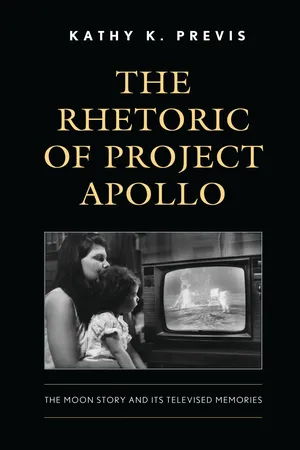
- 225 pages
- English
- PDF
- Available on iOS & Android
eBook - PDF
About this book
On July 20, 1969, Americans not only landed on the Moon, but the televised spectacle forever changed the ways in which news and commentary about historical events would be presented to audiences. In The Rhetoric of Project Apollo, Kathy Previs provides a comprehensive analysis of the rhetorical strategies that CBS News employed in covering the Apollo missions from 1968–1972 and documents the role that NASA's public relations office had in televising the exciting moonshots. She illustrates how CBS's and NASA's symbolic representations followed a "ritual view of communication," enabling viewers to make sense of complex technological feats and scientific discoveries, while garnering public support for the costly missions. Based on four rhetorical categories – nationalism, romanticism, pragmatism, and technology – Previs also provides an in-depth analysis of which narratives have withstood the test of time in how Apollo is remembered on CBS News, and across a variety of televised platforms including CNN, the History Channel, and PBS, from 1973–2022, marking the 50th anniversary of Apollo's last mission. From Cold War metaphors to now recognizing the role women had in Apollo's successes, its story continues to resonate with and inspire audiences around the world.
Frequently asked questions
Yes, you can cancel anytime from the Subscription tab in your account settings on the Perlego website. Your subscription will stay active until the end of your current billing period. Learn how to cancel your subscription.
At the moment all of our mobile-responsive ePub books are available to download via the app. Most of our PDFs are also available to download and we're working on making the final remaining ones downloadable now. Learn more here.
Perlego offers two plans: Essential and Complete
- Essential is ideal for learners and professionals who enjoy exploring a wide range of subjects. Access the Essential Library with 800,000+ trusted titles and best-sellers across business, personal growth, and the humanities. Includes unlimited reading time and Standard Read Aloud voice.
- Complete: Perfect for advanced learners and researchers needing full, unrestricted access. Unlock 1.4M+ books across hundreds of subjects, including academic and specialized titles. The Complete Plan also includes advanced features like Premium Read Aloud and Research Assistant.
We are an online textbook subscription service, where you can get access to an entire online library for less than the price of a single book per month. With over 1 million books across 1000+ topics, we’ve got you covered! Learn more here.
Look out for the read-aloud symbol on your next book to see if you can listen to it. The read-aloud tool reads text aloud for you, highlighting the text as it is being read. You can pause it, speed it up and slow it down. Learn more here.
Yes! You can use the Perlego app on both iOS or Android devices to read anytime, anywhere — even offline. Perfect for commutes or when you’re on the go.
Please note we cannot support devices running on iOS 13 and Android 7 or earlier. Learn more about using the app.
Please note we cannot support devices running on iOS 13 and Android 7 or earlier. Learn more about using the app.
Yes, you can access The Rhetoric of Project Apollo by Kathy K. Previs in PDF and/or ePUB format, as well as other popular books in Languages & Linguistics & North American History. We have over one million books available in our catalogue for you to explore.
Information
Table of contents
- Cover
- Half Title
- Title Page
- Copyright Page
- Dedication
- Contents
- Acknowledgments
- Introduction
- Part I: The Apollo Moon Story: Communication, NASA, and Television
- Chapter 1: Apollo, Mythmakers, and Ritual Communication
- Chapter 2: Rhetorical Analyses and Televised Metaphors
- Chapter 3: NASA’s Public Affairs Office: The Apollo Years
- Chapter 4: Live from the Project Apollo and CBS’s “Space Headquarters”
- Part II: The Rhetorical Structures, 1968–2022
- Chapter 5: Nationalism
- Chapter 6: Romanticism
- Chapter 7: Pragmatism
- Chapter 8: Technology
- Conclusion
- CBS Coverage of Apollo by Mission 1968–1972
- Public Broadcasting System (PBS)
- The History Channel (THC)
- Notes
- Bibliography
- Index
- About the Author